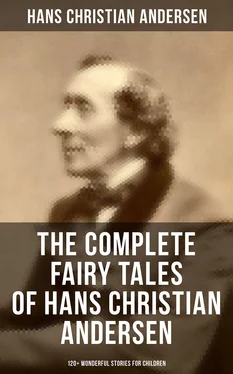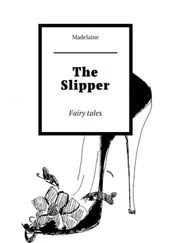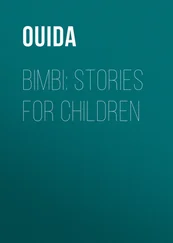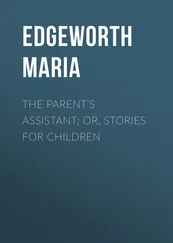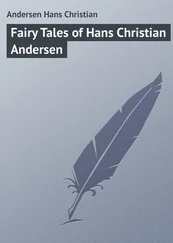As these thoughts passed through her mind, fear gave speed to her feet, so that she walked faster and faster. Fear came upon her as if a cold, clammy hand had been laid upon her heart, so that she almost fainted. As she looked across the sea, all there grew darker; a heavy mist came rolling onwards, and clung to bush and tree, distorting them into fantastic shapes. She turned and glanced at the moon, which had risen behind her. It looked like a pale, rayless surface, and a deadly weight seemed to hang upon her limbs. “Hold,” thought she; and then she turned round a second time to look at the moon. A white face appeared quite close to her, with a mist, hanging like a garment from its shoulders. “Stop! carry me to consecrated earth,” sounded in her ears, in strange, hollow tones. The sound did not come from frogs or ravens; she saw no sign of such creatures. “A grave! dig me a grave!” was repeated quite loud. Yes, it was indeed the spectre of her child. The child that lay beneath the ocean, and whose spirit could have no rest until it was carried to the churchyard, and until a grave had been dug for it in consecrated ground. She would go there at once, and there she would dig. She turned in the direction of the church, and the weight on her heart seemed to grow lighter, and even to vanish altogether; but when she turned to go home by the shortest way, it returned. “Stop! stop!” and the words came quite clear, though they were like the croak of a frog, or the wail of a bird. “A grave! dig me a grave!”
The mist was cold and damp, her hands and face were moist and clammy with horror, a heavy weight again seized her and clung to her, her mind became clear for thoughts that had never before been there.
In these northern regions, a beech-wood often buds in a single night and appears in the morning sunlight in its full glory of youthful green. So, in a single instant, can the consciousness of the sin that has been committed in thoughts, words, and actions of our past life, be unfolded to us. When once the conscience is awakened, it springs up in the heart spontaneously, and God awakens the conscience when we least expect it. Then we can find no excuse for ourselves; the deed is there and bears witness against us. The thoughts seem to become words, and to sound far out into the world. We are horrified at the thought of what we have carried within us, and at the consciousness that we have not overcome the evil which has its origin in thoughtlessness and pride. The heart conceals within itself the vices as well as the virtues, and they grow in the shallowest ground. Anne Lisbeth now experienced in thought what we have clothed in words. She was overpowered by them, and sank down and crept along for some distance on the ground. “A grave! dig me a grave!” sounded again in her ears, and she would have gladly buried herself, if in the grave she could have found forgetfulness of her actions.
It was the first hour of her awakening, full of anguish and horror. Superstition made her alternately shudder with cold or burn with the heat of fever. Many things, of which she had feared even to speak, came into her mind. Silently, as the cloud-shadows in the moonshine, a spectral apparition flitted by her; she had heard of it before. Close by her galloped four snorting steeds, with fire flashing from their eyes and nostrils. They dragged a burning coach, and within it sat the wicked lord of the manor, who had ruled there a hundred years before. The legend says that every night, at twelve o’clock, he drove into his castleyard and out again. He was not as pale as dead men are, but black as a coal. He nodded, and pointed to Anne Lisbeth, crying out, “Hold fast! hold fast! and then you may ride again in a nobleman’s carriage, and forget your child.”
She gathered herself up, and hastened to the churchyard; but black crosses and black ravens danced before her eyes, and she could not distinguish one from the other. The ravens croaked as the raven had done which she saw in the daytime, but now she understood what they said. “I am the raven-mother; I am the raven-mother,” each raven croaked, and Anne Lisbeth felt that the name also applied to her; and she fancied she should be transformed into a black bird, and have to cry as they cried, if she did not dig the grave. And she threw herself upon the earth, and with her hands dug a grave in the hard ground, so that the blood ran from her fingers. “A grave! dig me a grave!” still sounded in her ears; she was fearful that the cock might crow, and the first red streak appear in the east, before she had finished her work; and then she would be lost. And the cock crowed, and the day dawned in the east, and the grave was only half dug. An icy hand passed over her head and face, and down towards her heart. “Only half a grave,” a voice wailed, and fled away. Yes, it fled away over the sea; it was the ocean spectre; and, exhausted and overpowered, Anne Lisbeth sunk to the ground, and her senses left her.
It was a bright day when she came to herself, and two men were raising her up; but she was not lying in the churchyard, but on the sea-shore, where she had dug a deep hole in the sand, and cut her hand with a piece of broken glass, whose sharp stern was stuck in a little block of painted wood. Anne Lisbeth was in a fever. Conscience had roused the memories of superstitions, and had so acted upon her mind, that she fancied she had only half a soul, and that her child had taken the other half down into the sea. Never would she be able to cling to the mercy of Heaven till she had recovered this other half which was now held fast in the deep water.
Anne Lisbeth returned to her home, but she was no longer the woman she had been. Her thoughts were like a confused, tangled skein; only one thread, only one thought was clear to her, namely that she must carry the spectre of the sea-shore to the churchyard, and dig a grave for him there; that by so doing she might win back her soul. Many a night she was missed from her home, and was always found on the sea-shore waiting for the spectre.
In this way a whole year passed; and then one night she vanished again, and was not to be found. The whole of the next day was spent in a useless search after her.
Towards evening, when the clerk entered the church to toll the vesper bell, he saw by the altar Anne Lisbeth, who had spent the whole day there. Her powers of body were almost exhausted, but her eyes flashed brightly, and on her cheeks was a rosy flush. The last rays of the setting sun shone upon her, and gleamed over the altar upon the shining clasps of the Bible, which lay open at the words of the prophet Joel, “Rend your hearts and not your garments, and turn unto the Lord.”
“That was just a chance,” people said; but do things happen by chance? In the face of Anne Lisbeth, lighted up by the evening sun, could be seen peace and rest. She said she was happy now, for she had conquered. The spectre of the shore, her own child, had come to her the night before, and had said to her, “Thou hast dug me only half a grave: but thou hast now, for a year and a day, buried me altogether in thy heart, and it is there a mother can best hide her child!” And then he gave her back her lost soul, and brought her into the church. “Now I am in the house of God,” she said, “and in that house we are happy.”
When the sun set, Anne Lisbeth’s soul had risen to that region where there is no more pain; and Anne Lisbeth’s troubles were at an end.
THE CONCEITED APPLE-BRANCH
Table of Contents
It was the month of May. The wind still blew cold; but from bush and tree, field and flower, came the welcome sound, “Spring is come.” Wild-flowers in profusion covered the hedges. Under the little apple-tree, Spring seemed busy, and told his tale from one of the branches which hung fresh and blooming, and covered with delicate pink blossoms that were just ready to open. The branch well knew how beautiful it was; this knowledge exists as much in the leaf as in the blood; I was therefore not surprised when a nobleman’s carriage, in which sat the young countess, stopped in the road just by. She said that an apple-branch was a most lovely object, and an emblem of spring in its most charming aspect. Then the branch was broken off for her, and she held it in her delicate hand, and sheltered it with her silk parasol. Then they drove to the castle, in which were lofty halls and splendid drawing-rooms. Pure white curtains fluttered before the open windows, and beautiful flowers stood in shining, transparent vases; and in one of them, which looked as if it had been cut out of newly fallen snow, the apple-branch was placed, among some fresh, light twigs of beech. It was a charming sight. Then the branch became proud, which was very much like human nature.
Читать дальше
